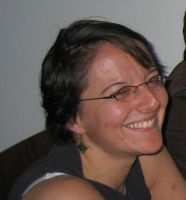Introduction: Hazards of life…
Maybe this post ought have come first before my comment on the Three Societies Meeting just up the blog. Still as it was more about me I have preferred leaving it out as second. I hope not being murdered for that.
I am Sandra Mols, young researcher on an interdisciplinary project with Marie d'Udekem-Gevers on Belgian computing history at the CITA, FUNDP, Namur, Belgium. My relationship with computing history dates back to a dissertation on Georges Lemaître, internationally known for being a forerunner of the Big Bang theory, and locally for his useless and yet expert computing research and efforts at creating the first computing laboratory at the Université Catholique de Louvain in the 1950s.
Some time later I debarked at the Centre for the History of Science, Technology and Medicine of the University of Manchester, where Jeff Hughes and Jon Agar redirected me from astronomy at Jodrell Bank towards the crystallographic computing practices at the 1950s Manchester Computing Machine Laboratory. Then I had a one-day fascinating encounter with a gentleman who offered me strawberries with double cream for dessert.
This gentleman was Durward Cruickshank, a crystallographic computing expert from the 1950s whose many tales of error containment while using the Manchester Mark I and Pegasus got me to fall in love with the study of the expert treatment of the errors and failures that shape up the development of computerisation processes in practice: human error, technical defects, machine error, input and output error. Before I realised I was soon embarked on a PhD dissertation on 1950s crystallographic computing practices. From then on, my love for computing error became obsessive after extensive readings on Metropolis and Wilkinson. From then on too I tried on never to judge the historical importance of a computing research programme upon its official reputation of being a forerunner or so. The worst the reputation of a researcher in computing the more he (or she) is of interest to me.
With this as my brief vitae, let's continue the work - i.e. editing and correcting transcripts of interviews of Belgian pioneers.


